- Home
- Penelope Lively
*****Passing On***** Page 2
*****Passing On***** Read online
Page 2
Louise worked for a firm of design consultants; Tim was in advertising. Long ago, Louise had been Helen’s baby sister — adorable, charming, vulnerable, to be looked after and protected.
This Louise seemed very far away and inaccessible now: from time to time, though, she surfaced, weeping over the telephone of betrayals, impositions and the cruelty of fate. More often, the Louise of today scolded Helen for conservatism, retrenchment and, above all, for not standing up to their mother. ‘I live with her,’ Helen used to say. ‘You don’t. That is the difference.’
Louise got out, as she put it, when she was seventeen. She had a series of rows with Dorothy and flounced off to art school, where she conned the authorities over the question of parental consent and support. There was more trouble. Eventually Dorothy gave in, reluctantly and vociferously, and Louise, from then on, was at one remove from Greystones, returning for Christmas and the occasional weekend, an unruly emotive draught of alien worlds. ‘You and Edward can’t just stay here for ever,’ she said, each time. ‘I mean, for God’s sake, Helen, you’re thirty . .
have to see what turns up,’ Helen would say.
And in the event nothing did. Or not enough.
When the Dysons had gone Helen and Edward got down to the washing-up. Edward stooped over the sink — always inconveniently low — while Helen dried. Helen would have preferred to be left to deal with the mess on her own, in which case she could have brought out her illicit bottle of Fairy Liquid, but Edward would have been hurt to be shooed away at this moment. He wanted to talk. A scum of grease floated on top of the washing up water; the dishes were slimy. Edward, an ardent conservationist, ignored the fact that detergents had been biodegradable for
fifteen years. Lurid still in his mind’s eye were the foam-packed rivers of the sixties, the rafts of dead fish, the blighted vegetation.
Detergent never disgraced Greystones, or at least none that Edward knew about.
He said, ‘How did Phil’s hair get like that?’
‘It’s dyed, I suppose.’
Edward pondered. ‘He seems a perfectly nice boy still. What an awful day. The bit in the churchyard was worst of all.’
‘Yes. Do scrape that plate before you wash it. Shut up, Tam!’
Tam, Edward’s rough-haired white terrier, squatted in the middle of the floor moaning with lust. He was a dog of unassuageable greed. Edward looked down at him, and then at the table, on which was a dish piled with sausage rolls and volau-vents.
He said, ‘Would we eat these, do you think?’ Without waiting for an answer he slid two sausage rolls and a chicken volau-vent into Tam’s bowl. Helen said nothing. They looked at each other, both realising that this had never before been done openly and unashamedly. Tam, as though in recognition that from now on things were going to be different, belched with roomy satisfaction. Dorothy had fought, for forty years, a vigorous and vindictive campaign against Edward’s animals, from the kitten smuggled in when he was a schoolboy to the official but resented dogs of later years.
Now I feel guilty,’ said Edward. ‘Is it always going to be like that?’
‘That’s what we’re going to find out, I suppose.’
Edward, dabbling inefficiently in the murky sink, said ‘I’ve never seen these plates before, where did they come from?’
‘They were a wedding present of mother’s, I think. We never used to use them, but I had to get out everything for today, or there wouldn’t have been enough.’
As it was, nothing went with anything else, a medley of glasses, cups, plates surviving from once complete sets. Chipped cups, rogue saucers without a partner, pieces of cloudy pre-war pyrex. ‘There is absolutely nothing at Greystones that is nice to look at,’ said Louise once, in a fit of rage, and Helen, dispassionate and not caring one way or the other, could see that she was absolutely right.
‘Actually,’ said Edward, ‘they’re rather pretty.’ He held the plate clear of the sink to inspect it and it at once slid from his fingers to crash into several pieces upon the tiled floor.
They scrabbled for dustpan and brush, bumping into each other. Edward, assembling the bits on the draining-board, said anxiously, ‘Isn’t there some process for mending things like this?
Riveting or something?’
‘Why bother?’ said Helen.
‘But …’ He looked at her. ‘No. I see what you mean. All the same …’ He stacked the pieces on the shelf beside the Coronation biscuit tin where, Helen suddenly saw with awful clarity, they would stay for the next five years.
They finished clearing up and went back into the drawing room. It was early evening now and the wet garden glinted in the low sunshine. Beyond it was the shaggy mass of the Britches and above the blackbirds and robins came the shrill whine of a chainsaw in Ron Paget’s yard. The mantelpiece clock struck six and the chainsaw ceased abruptly.
Helen watched him walk towards the Britches. She knew exactly where he would go. He would sit on the fallen tree-trunk somewhere in the midst of that muddle of vegetation, doing nothing. He would come back in half an hour or so, apparently in some way renovated.
The village, at the outer rim of the Cotswolds, was also on the edge of notability. It was not one of those places that people tell each other they mustn’t miss. The church was good but not exceptional. There was a respectable acreage of limestone, mullioned windows and drip-moulding but few single buildings of any distinction. There was nothing much to take a photograph of. Nor was there any antique shop or anywhere selling country jams, dried flowers and basketry from Hong Kong. The village store was a small supermarket and sold food only, rather expensively and of second-rate quality. Most people shopped ten miles away on Saturdays, by car.
Most of them also worked ten or fifteen miles away. They worked in offices and hospitals and shops. There were a few schoolteachers and a scattering of retired people, the rector and his wife in a new Barratt’s Executive Home and an industrialist and his family in the Old Rectory. Sociologically classified, they would have come out as preponderantly A’s and AB’s with a sprinkling of C’s; council housing had been kept to a minimum in Long Sydenham and what there was was mainly built before the war. The Glovers, Edward and Helen, and — hitherto — Dorothy, were presumably AB or thereabouts, by occupation (Edward taught, Helen worked as a part-time librarian). In terms of income and life-style, though, they were a bit of a puzzle, to the rest of the village, at any rate.
Within the village wealth was unequally distributed. Of course; it always is. There were the Hadleys at the Old Rectory who were so very much richer than everyone else that they were beyond competition, outside the fray. Their sleek cars, Mrs Hadley’s even sleeker hunters, the rumoured house in the West Indies and yacht at Fowey were like the attributes of gods, only to be expected. Beneath them, nearly everyone else jostled within an income band narrow enough to allow for plenty of resentment, aspiration and emulation. The matters at issue were housing, cars, electrical and electronic appliances, holidays and children’s schooling — probably in that order. Right at the bottom were those poor enough to be immune from competition, concerned only with survival. There were not many of these, Long Sydenham being geographically fortunate: a handful of old age pensioners, a couple of large families (considered feckless), a single parent (ditto) and a few unemployed, most of whom were very young.
While none of these were in danger of starvation, they were nevertheless obliged to contemplate daily the lavishness around them, from the Hadleys’ Mercedes gliding past their door to the five pound box of chocolates in the village shop, almost equally inaccessible. The advertisements on their television screens made certain that they should be in no danger of forgetting the range of consumer goods available and the urgency and intensity of normal need for these things.
The Glovers were a problem, where wealth status was concerned.
The house, one of the largest and — at least potentially — most valuable in the village, put them in one category. So did their accents an
d their education; old Dorothy’s self-confidence was generations deep. But patently there was no loose cash swilling around at Greystones. You only had to look at their cars, at the furnishings within (nothing new within sight, no central heating, no dishwasher, only the most decrepit old twin tub washing-machine); none of them was known to go abroad at all. As for their clothes …
The failure of the Glovers to fit properly into a category troubled the village, which liked to know where it was with people. The inhabitants of the Barratt Executive Homes did not know whether to defer or to be kindly patronising and ended up doing both, disconcerting themselves. The Hadleys were so set apart by wealth that, like old-fashioned aristocrats, they saw everyone else as a featureless proletariat and were uniformly bland to everyone; they would never have noticed the Glovers.
The older inhabitants of the council houses had had a barbed relationship with Dorothy Glover for many a long year. Their children and grandchildren, less conditioned and more broadminded, thought her a bad-tempered old bag but rather liked Edward and Helen, who were in no way stuck-up and not given to complaining about noisy motor bikes.
There were only two industrial enterprises in Long Sydenham.
At one end of the village the Old Forge made wrought iron garden gates, firescreens, lampstands and candlesticks. It wouldn’t have known what to do with a horse if it saw one. At the other, divided from Greystones by the cordon sanitaire of the Britches, was Ron Paget’s builders’ yard, a place of noise, mud, lorries, churning cement-mixers and stacks of bricks.
The Britches was a piece of mixed scrub and woodland about two acres in extent. It was known as the Britches to everyone in the village for reasons now lost; that was its name, simply. It belonged to the Glovers; their garden, indeed, melted into it at an indeterminate point where the back of a shrubbery gave way to docks, elder bushes, and a few diseased apple trees long past Producing anything but a sparse rash of blossom in spring.
Beyond that was an expanse of grass that was waist high by August, and huge billowing clumps of nettles, and beyond that again a thickly tangled place of beech, birch, elder and an undergrowth of brambles and low bushes above a blanket of leafmould. There was a vague belief at Greystones that the Britches had once been a quarry; certainly the ground was very uneven. Long ago Edward had constructed a rockery in the garden with large stones hauled from there. It was divided from Ron Paget’s yard by a high but battered fence through which came marauders by way of dogs, cats and children. From time to time unpleasant things turned up: animal corpses, hanks of lavatory paper and used condoms.
The village had long marvelled over the Britches. Throughout the rapacious seventies, when every other morsel of waste ground within miles, every barn, shed, pigsty, dilapidated cottage, every orchard and a good many back lawns had been turned to financial advantage by their owners, Dorothy Glover had disregarded the blandishments of speculative builders. Foremost among them, naturally, was Ron Paget. He had tried everything, varying his approach from brisk outright proposals to more subtle manoeuvres, moving from periods of relentless pressure to times of tactful neighbourly solicitude. Dorothy ignored him.
From time to time people raised the matter, driven by curiosity and perplexity. If you sold the Britches, they said (circuitously, delicately, wrapping it up in euphemisms …) you could buy a new car, put in central heating, have a holiday in the Bahamas, go and live in Have. Helen and Edward could have cars, holidays, new clothes, consumer goods. You would all inspire respect and envy. You would look nicer. You would be asked out more. Helen and Edward would have sexual clout. Money is power.
The years went by and the Britches remained unsold and untouched. It became apparent to the village that you were dealing with people who were beyond reason and impervious to common sense. Those who had attributed to Dorothy Glover financial acumen and patience greater than their own — the old bat was waiting till land prices rocketed even higher — came to realise that they were mistaken. Land prices peaked, and peaked again; planning permissions poured forth from the offices of the county council, and still she did not sell. She wasn’t ever going to sell: she meant what she said.
Dorothy herself never went into the Britches, Helen only rarely. The only person who visited it regularly was Edward, to monitor the ecology. There was a surprising amount of it if you knew what you were looking for. A pair of tawny owls nested, as did green and spotted woodpeckers. Warblers abounded.
There were treecreepers and occasionally a nuthatch, goldfinches and every kind of tit. There was a good assortment of butterflies and moths. Flora did rather less well; the surviving patch of bluebells was imperilled by ranker growths, the few wood anemones had vanished along with the purple spotted orchids that were now almost legendary. But there were some ramsoms and plenty of celandine and self-heal and ground ivy and more ordinary stuff. Edward fought a halfhearted battle with grey squirrels and magpies, considered to be a threat to the choicer forms of bird life. Helen, from time to time, pointed out the irrationality of this: ‘You’re interfering, in fact. Tampering with the system. And why is one bird more desirable than another?’
Edward, while admitting the ambiguity, said that one couldn’t help feeling that way. As it was, all he was able to bring himself to do was to make shooing noises and, on occasion, destroy a magpie nest. When, years ago, Ron Paget had spotted what he was at and offered to come over with a shotgun, Edward had been appalled. Helen pointed out the irrationality of this, also.
It was starting to rain again. Helen continued to stand at the window and after a few minutes Edward appeared, breaking out of the gap in the shrubbery that was the normal route to the Britches. He had not changed out of the suit, his only one, which would now have bits of twig and leafmould on it when next it was required. He looked exactly what he was: an absent-minded well-intentioned school teacher approaching fifty.
TWO
During the ensuing days Helen felt as though her mother were continuously present in the house as a large black hole. There was a hole in Dorothy’s bedroom, in the bed where she was not, on which, now, the blankets were neatly folded and the cover spread. There were various other holes, where she stood at the kitchen table preparing one of those unappetising stews, or shouting instructions from the landing or inspecting a caller at the front door. There were perambulant holes in which she creaked down the stairs or came in through the front door.
Almost, Helen stood aside to let her pass or manoeuvred around her large black airy bulk as she occupied the scullery or the narrow passage by the back stairs. It was weeks before Helen could walk straight through her, or open her bedroom door without bracing herself for the confrontation.
Louise telephoned, almost daily. ‘Are you all right?’
‘Of course I’m all right.’
‘And Edward?’
‘Edward’s all right too,’ said Helen, rather crossly. ‘Why shouldn’t we be?’
‘After all this time. You’re so used to her. I mean, I can’t quite take it in myself yet. It’s a shock.’
No it isn’t,’ said Helen. ‘We all knew she was going to die.’
‘Yes, but we didn’t properly believe it. One doesn’t. She didn’t, certainly, which I suppose was just as well. ‘Oh gosh . . — Louise’s voice trailed away — ‘I still can’t . .
Dorothy, who had seldom had a day’s illness in her eighty years, had disputed the diagnosis. She had contradicted it flatly.
‘The stupid man says I’ve got something foul,’ she announced. ‘I told him not to be so silly.’ As the disease progressed she blamed
the consultant for ineffective or faulty treatment, baying at him across his desk in the hospital or railing over the telephone. When eventually it reduced her to bed, and at last to a glaring silence, the specialist came into his own, able to commend her fighting spirit. ‘Your mother never gave in,’ he told Helen and Edward, portentously. ‘One can tell the truth to someone like that and know that it will inspire strength rather than des
pair.’ Helen hadn’t had the heart to say that her mother had never for one moment believed him. Her dead face had worn, it seemed, an expression of outrage and incredulity.
‘You should have a holiday,’ said Louise. ‘Go off somewhere.
Look, we’ve this friend who’s got a cottage in the Lake District . .
‘No thanks. I’m too busy. I’m getting back to the library as soon as I’ve got the house sorted out.’
During the long weeks of her mother’s illness Helen had had to take leave from the library. She looked forward, now, to a return to those brisk impersonal days. First, though, there were chores. The paraphernalia of nursing had to be disposed of, bills attended to, those things done which had not been done. She saw that the drooping gutter at the front of the house was now quite unsupported, and that there was yet another slate off the roof. Ron Paget had been asked to come and had not. Foolish to have imagined that one request would suffice. With the back of the Morris Minor piled up with the things for the Red Cross — the commode, the back supports — she stopped off at the yard, Spotting Paget loading one of his lorries.
‘Mr Paget!’
He came across. They were old sparring partners. He was almost pleased to see her, she saw — gingered up at the thought of a little contest. Over the years there had been plenty: questions of noise and dirt from the yard, the dominant continuous issue of the Britches, Ron’s need to keep in with Greystones offset against Greystones’ frequent need for minor repairs and services.
We have grown middle-aged together, thought Helen. Except that Ron has also grown richer and richer, and shed his dull old Wife and got a glossier younger one, and progressed from a beat up van to a flashy new car every year. The times have been good to Ron. More so than to me. She thought of him as Ron, but always addressed him with formality, for good strategic reasons.

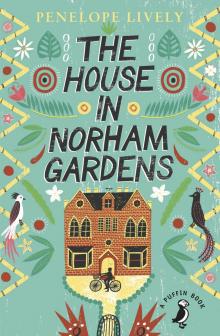 The House in Norham Gardens
The House in Norham Gardens Family Album
Family Album Life in the Garden
Life in the Garden Oleander, Jacaranda: A Childhood Perceived
Oleander, Jacaranda: A Childhood Perceived Cleopatra's Sister
Cleopatra's Sister Next to Nature, Art
Next to Nature, Art A Stitch in Time
A Stitch in Time Moon Tiger
Moon Tiger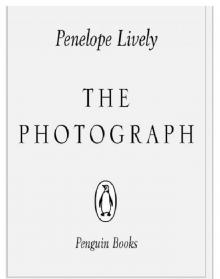 The Photograph
The Photograph Heat Wave
Heat Wave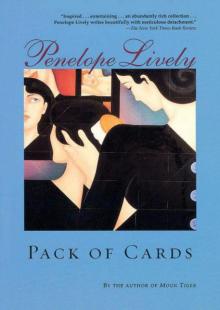 Pack of Cards
Pack of Cards Spiderweb
Spiderweb How It All Began
How It All Began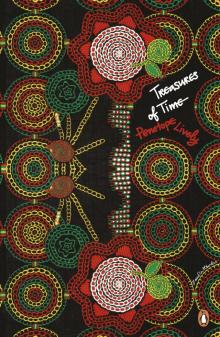 Treasures of Time
Treasures of Time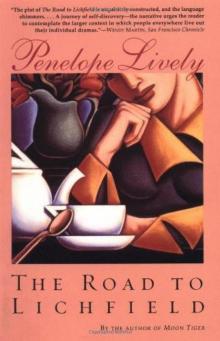 The Road to Lichfield
The Road to Lichfield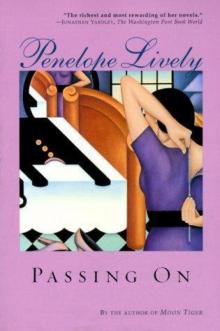 Passing On
Passing On Making It Up
Making It Up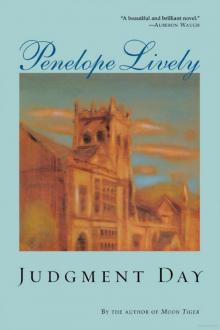 Judgment Day
Judgment Day The Purple Swamp Hen and Other Stories
The Purple Swamp Hen and Other Stories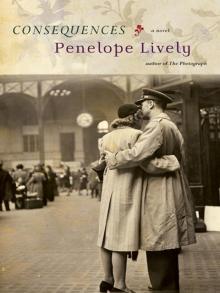 Consequences
Consequences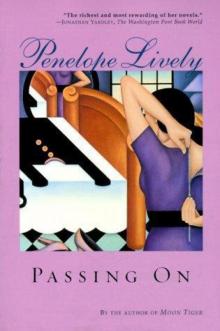 *****Passing On*****
*****Passing On*****